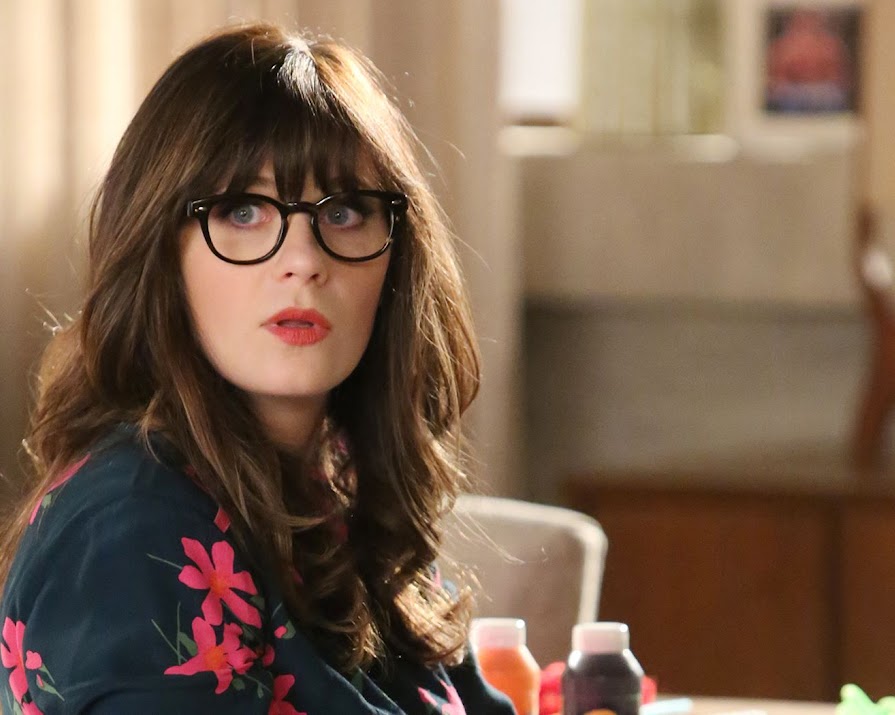By Louise Bruton
22nd Oct 2019
22nd Oct 2019
Internalised sexism is a funny thing to address. Even if you identify as a feminist or mostly hang around with other women, internalised sexism is so ingrained that you may not even realise that you’re doing it. This may sound silly but I realised that I had my own battles to face with sexism when I wasted years rejecting the charms of the TV show New Girl. Bear with me.
The clue was in the show’s title. The clue was in the lead character Jessica Day, who was played by the super droll Zooey Deschanel, who I also irrationally had a problem with (more details below).
I had a problem with this show, without ever watching it, because it had a woman at the centre of its existence. I made assumptions as to what the show would be about and I stupidly decided that it wasn’t for me. I imagined scenarios where her housemates — all men — would be reduced to rubble if Jessica casually mentioned that she had her period. I could picture scenes where they would somehow become entangled in Jessica’s laundry load of underwear and that would be the gag; womanly things and women themselves were silly and they intrude on men’s day-to-day life.
Of course, that isn’t what the show is about at all.
Jess doesn’t cause consternation when she moves into their loft apartment in LA just because she’s a woman. She upsets the balance because she’s a little nerdy and weird, and her tics reveal the heightened collective weirdness of Nick Miller, Schmidt, Coach and Winston Bishop.
Across the seven series, the show deals with sexism; racism; friendship; close relationships with cats; drinking games; unemployment; marriage; parenthood and the growing pains of staying friends with your ex. I could go on about my love of New Girl but I’ll sum the show up as a hearty bowl of hilarious soup for your soul.
I thought I was above things that were marketed towards women
I guess I saw what I wanted to see. Back then, I wanted to think that I was better than a fictional portrayal of a woman, even if the character was created by a woman (Elizabeth Merriweather). Perhaps I thought I was above things that were marketed towards women, even though New Girl is a show for everyone.
Perhaps I didn’t take Jess seriously because she likes wearing tea dresses, cardigans and bows in her hair and I couldn’t connect to women who proudly presented traditional femininity. Isn’t that pathetic?
Earlier this year, the movie 500 Days of Summer, starring Deschanel as Summer, celebrated its tenth anniversary. In a commemorative piece with Entertainment Weekly, Deschanel rewatched the movie with her co-star Joseph Gordon-Levitt, who played Tom, the lovesick male lead.
The basis of the movie was that Tom liked Summer, Summer liked Tom but Summer didn’t want a relationship with Tom. And she told him that. A lot. He never listened. Oh! And they both also liked The Smiths.
With ten years of hindsight and ten years of reading reviews and hot takes, Deschanel picked up on what other fans (or non-fans) thought of Summer. “It is 100 per cent from Tom’s point of view, which we’ve talked about before, but it’s one thing people very much misunderstand about the movie,” she says. “They think Summer’s a villain”.
We’re wrongly taught that women trick men
And she’s right. With clouded judgment, you can say that Summer led Tom on, but as Deschanel clarifies, as soon as Summer begins to open up, the voiceover (which leaned towards Tom’s perspective) drowns her out. Intentionally done, our lead hero in the story is actually the villain.
He projects his fantasies of the Summer he wants without learning about Summer the woman in front of him. Rewatching it, it’s so clear that that’s the case but when it first came out, well, I hated them for giving so much weight to The Smiths but I also couldn’t believe Summer. I felt like she was tricking Tom because that’s what we’re wrongly taught in media and in art — that women trick men. I had to unlearn that teaching and realise that women like Summer exist and are not the bad guys.
Unlearning sexism is an uphill battle, but as soon as you see your pattern, you have a second chance to enjoy the music, literature and art made by and for women that up until that point, you may have ignored.
One of the biggest examples I can think of is Madonna. Based on her age and her gender, I disregarded her even though she is one of the most important figures in modern music. I took the bait and I went with it. We’ve had almost 40 years of people criticising her looks, her talent, her work and her attitude towards sex, success and religion and those critiques can unwillingly shape your own opinion of her. There’s an institutionalised hatred towards Madonna and almost every other female artist and we can be guilty of going along with it.
I saw this behaviour in other people when A Star is Born was released last year. I saw people tweeting that there was “just something about” Lady Gaga that annoyed them, even though she stole the show and made the role her own — a role that saw the greats before her — Janet Gaynor, Judy Garland and Barbara Streisand — do the very same. Bradley Cooper however, got close to no criticism of the sort — even though it doesn’t take much Googling (might I suggest ‘Bradley Cooper + Lolita’) to find multiple ways to be annoyed by him.
I dismissed art made by women
I thought that I had solved the issue of internalised sexism when I cleared up my Madonna crisis but I caught myself doing the same thing again this year.
This time, it was over the Netflix series Workin’ Moms. Sitting in my Recommended Shows section for months, I refused to believe that I could enjoy it.
Why? Because the word ‘moms’ was in the title? Because there was something funny about mothers who also work? Ugh. Yes. I New Girl-ed Workin’ Moms without even giving it a chance.
After some hesitance, I watched it and devoured two seasons in the space of a week. It’s filthy, it’s dark and it’s proper LOL funny. It is brilliant. And I’m an idiot for denying myself its brilliance because I still have a hang up about how my gender is portrayed on TV. Instead of checking it out, I held onto that hang up and dismissed art made by women.
Putting a stop to practised behaviour
Even though I describe myself as a feminist and run a club night that only plays music by women, I am still guilty of internalised sexism. I have to check myself and check again that I’m not a repeat offender.
How many books by female authors do I have in my home? Do I have more songs by men than women in my Spotify playlists? Which TV shows do I like? Which ones do I refuse to watch? Am I criticising more female TV hosts, radio personalities, politicians, singers, celebrity chefs or reality stars than male? Do I say ‘chick-lit’ with a certain tone that indicates it’s below me?
I’m guilty of all of the above but after a lifetime of thinking that it’s the done thing, I have to put a stop to this practised behaviour.
People are entitled to dislike other people but sometimes it’s important to question why you don’t like them. Saying that there’s “just something about her” is an answer with no point — but it’s probably more pointed than you realise.
Read more: ‘Identifying as a feminist felt like my scarlet letter’
Read more: Preachy? Hypocrites? Prince Harry and Meghan Markle will never win
Read more: The online reaction to the Miley Cyrus and Liam Hemsworth split is telling






















